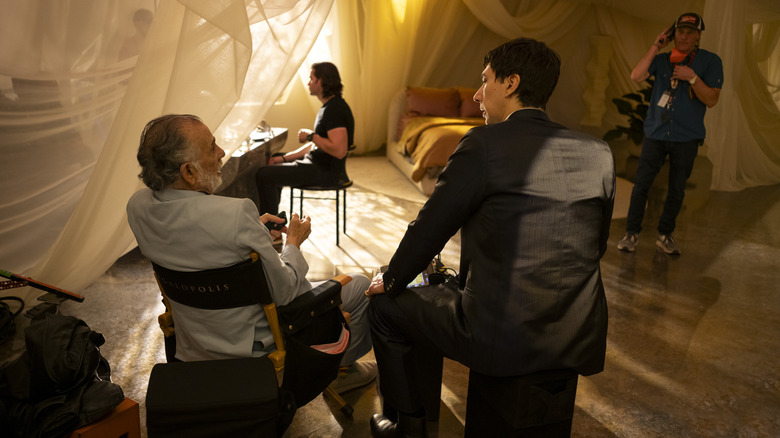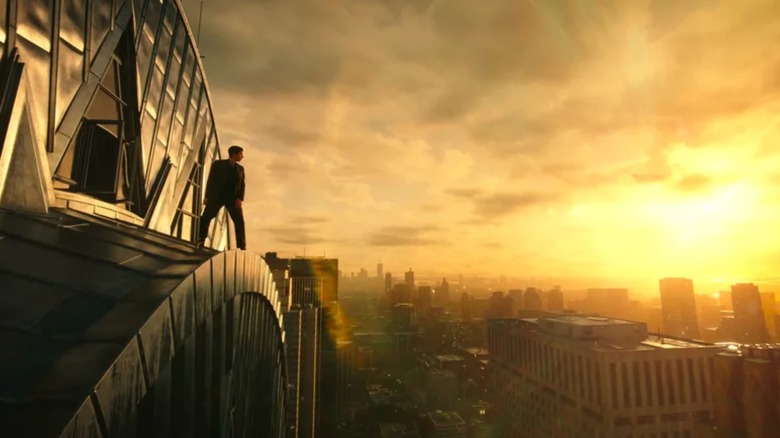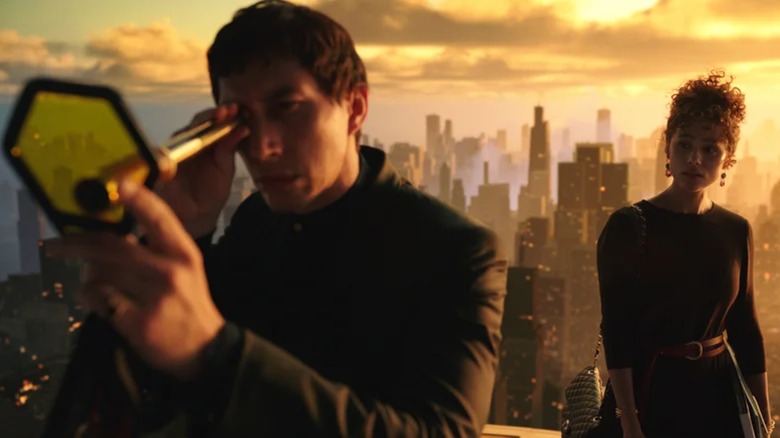Francis Ford Coppola Comments On Those Controversial Megalopolis Crew Exits
By now, the mythology surrounding Francis Ford Coppola's "Megalopolis" is perhaps larger than the perplexing film itself. The ambitious sci-fi tale has been decades in the making, and with stories of money troubles, set dysfunction, AI-generated pull quotes, and alleged sexual misconduct behind the scenes, "Megalopolis" has made the news for all the wrong reasons. Now, ahead of the film's North American debut (it's set to screen at the Toronto Film Festival after premiering at Cannes earlier this year), Coppola is sharing his own two cents. The director refutes claims that the movie's production was off the rails by describing, well, a production that sounds like it went off the rails.
For the latest issue of Empire Magazine, Coppola was asked to explain what went down between himself and the film's art and visual effects departments. In early 2023, The Hollywood Reporter broke the news that Coppola had fired most of his visual effects team in December 2022, leading the rest of the VFX workers to walk away from the production. Speaking to Empire, Coppola paints a picture of contrasting visions, but he also comes across as frankly out of touch with the needs of visual effects artists.
"'Megalopolis' had a big art-department need because you have to show the world of the future," Coppola explained, noting that he was interested in working with Beth Mickle after seeing her work as a production designer on Edward Norton's "Motherless Brooklyn."
"Ultimately, [Beth and I] really didn't share the same vision," Coppola told Empire. "We [later] disagreed to a degree that it was decided that the best thing would be if I hired a concept artist and came up with frames that showed what I wanted, which I did."
Coppola wanted to make Megalopolis less 'art-department-centric'
In addition to his creative conflict with Mickle, Coppola also claims "the art department was frustrated because they felt I was evolving the look of the picture independently of them." The director recalls that the art department was interested in delivering "giant sets and images," while he was more focused on making sure that "other elements like costumes and live effects" did "some of the work" for the movie. He did not want "Megalopolis" to "all be art-department-centric."
Coppola said that focusing on the art department (meaning, it seems, the film's visual effects) was putting the movie over budget. The famed director is no stranger to movies with ballooning budgets: his wildly expensive, off-track "Apocalypse Now" shoot is so infamous, it got its own making-of documentary. According to THR, Coppola was funding the initial $120 million budget for "Megalopolis" himself after the sale of his wineries. He told Empire:
"The picture was heading over budget [towards $148 million]. I said, "We have to now economise and make it much less expensive." The art department had a production designer, five art directors and a supervisor. It was very hierarchical. I said, "Let's fire one of the five art directors," and they said, "Well, if you do that, we'll all resign." And I did and they did.
It should go without saying that firing crew members partway through a film due to bad money management isn't a good look, but it's certainly happened before. At this point in his Empire interview, Coppola alludes to the reports that came out from the set of the movie, saying of the VFX team: "Then, of course, they bad-mouth us: 'Oh, this picture is crazy.'"
'I'm the only one who knows what the director has in mind'
Coppola says he thought the movie was "going very well," complimenting the performances from the cast ("Megalopolis" stars Adam Driver, Giancarlo Esposito, Shia LaBeouf, Nathalie Emmanuel, Aubrey Plaza, and more). "I didn't want to economize," Coppola claims. "I wanted to get the art department to be smaller, and they didn't want to be smaller. They wanted all the other departments to be smaller." Never one to forgo speaking his mind, Coppola concluded:
"I said, 'Let's face it, I'm the only one who knows what the director has in mind. I don't care what you think.' Also, I'm not only the director — I was also putting up the money. So, to be told that I had to have a huge art department that I didn't want was absurd to me."
The director certainly has a point about the budget aspect of the film, but in 2024, it's probably about time for us to stop treating directors who consistently can't work with or respect their teams as misunderstood geniuses. This stuff may have flown in the '70s when Hollywood was abuzz with the energy of a new, freewheeling creative era (and also everyone was on coke), but these days, stories like this just sound like a bummer for almost everyone involved. Visual effects artists are notoriously overworked and underpaid, and they have enough to stress about without adding job security worries and workplace arguments on top of it all.
Is "Megalopolis" worth the lost jobs and alleged bad experiences people seem to have had along the way? I'd argue that no movie really is, but based on responses to the past "Megalopolis" controversies, it seems that plenty of film fans still see creative genius as a fair trade-off for alleged on-set misery. Audiences will be able to see for themselves what the movie amounts to when "Megalopolis" hits theaters on September 27, 2024.


